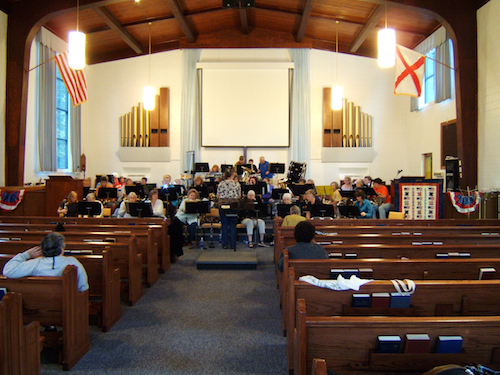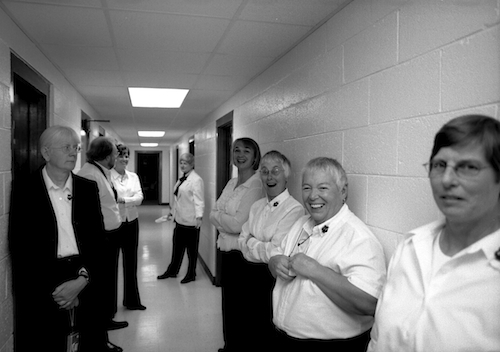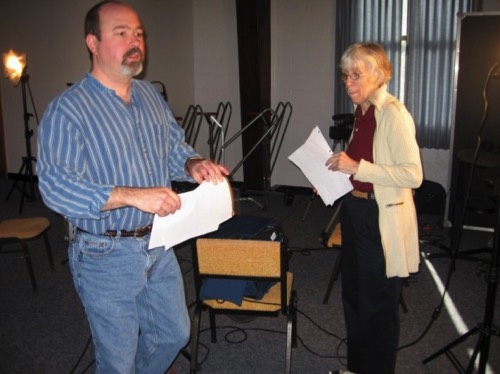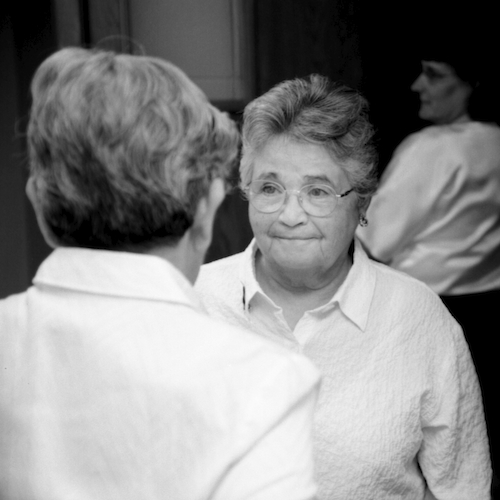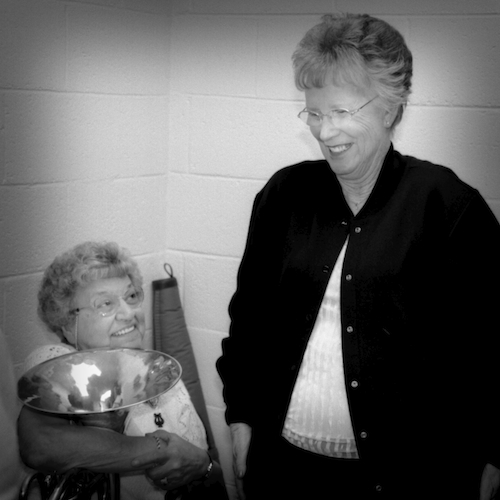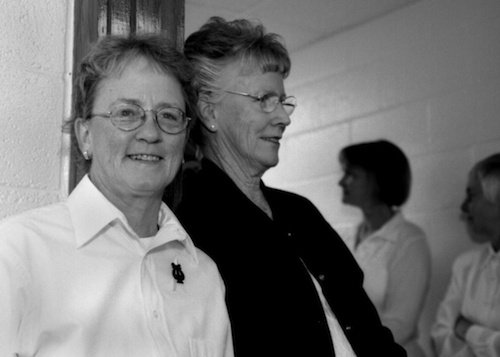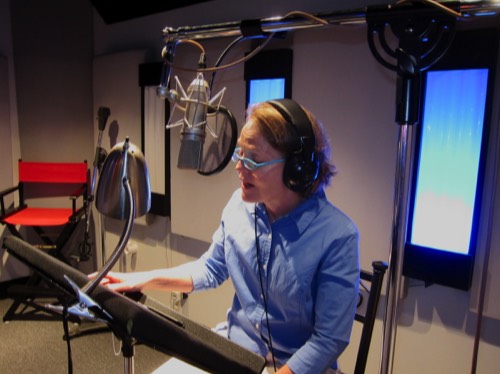Collateral Material
Right-click these links:
Download Silver Telly Award Press Release (PDF)
Download a high-resolution Quicktime of the trailer
Click this link to download the high-resolution Quicktime of the trailer
Also Available Upon Request
Original press release and production stills
Full retail DVD package for review
Professional voice-over studio with ISDN connection for radio interviews (at no cost)
SYNOPSIS
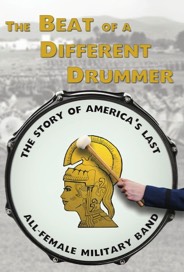
Operations within the WAC were much like the rest of the Army. However, unique to the Women’s Army Corps was the fact that it had but one band: the 14th Army WAC band. It would exist longer than any other all-female band in the military. This is their story.
From 1954 to 1976, the 14th Army WAC Band was stationed at Fort McClellan, Alabama, the training site for all WAC enlistees. Women musicians were not allowed to perform in male bands during most of this time; the 14th Army WAC Band was their only option—many for their entire careers. In contrast, male Army musicians rotated through different post bands. The longevity, camaraderie, demanding hours, and high-standards turned the 14th Army Band into an elite band, equal to the top male-only bands in the other military branches. They played for presidents and national radio and television audiences in addition to making whirlwind recruiting tours around the country. In many cities and towns across America, the WAC Band appearance was the event.
By the 1970s, the separation of women and men had become a huge burden on the military. The resulting push to integrate women into the regular Army was not without its challenges. And men who started to filter into the traditional WAC roles found it trying as well.
When the WAC Band ceased to exist as part of the Army, it lived on in the hearts of those who were a part of it. Today, many former members gather for a bi-annual reunion and concert. Their 2004 concert was the first time since 1976 that they had performed in public as the WAC Band.
This documentary uses interviews with former WAC Band members, WAC officers; and current Army musicians and bandmasters. There is extensive archival footage, pictures, articles, and memorabilia. Footage and pictures of Fort McClellan, both past and present, are also shown.
DIRECTOR'S
STATEMENT
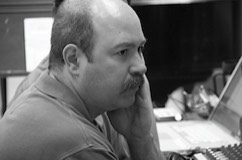
It started as an idea when my aunt, Jan Larson, told me she was planning to attend a WAC Band reunion and play in a concert. I could just only recall her being in the Army. Then she showed me a picture in a book from the National Archives that clearly showed her in a WAC Band group photo. This intrigued me, as I shared a love and background of music with my aunt. For the reunion, she would be rejoining friends, some of whom she hadn't seen in nearly fifty years. My aunt always did do things that were unusual for women at the time, like work as a mathematician for a military aviation manufacturer, play piano with numerous jazz giants, and own a business. So I wanted to meet some of these other women who might have the same moxie.
My original concept was to follow my aunt and her friends around while they caught up on old times. The documentary would be capped off with a concert at Fort McClellan, Alabama, the former WAC Training Center. But this idea was turned on its head and into an eight-year odyssey of research, interviews, phone calls, writing, and editing after I started to interview some of the participants. One woman was the first to command a major military installation with men, another was the first woman to be assigned to an all-male military band. Another was the first to...well you get the idea. This was an untold story of trailblazers.
I also discovered that this band was a hand-picked group of elite musicians that were on par with other elite military bands of the time. Although they played for presidents, on national radio and television, in the movies, and toured the country, they never got the same recognition or fame as their male counterparts. Many people who came to hear them were just curious about an "all-girl band," but were blown away once they heard them.
While the rest of America was struggling with equal rights, the WAC Band was a rare place where a woman could work as professional musician. The push for equality eventually led to the full integration of women into the military, and these soldiers were the pioneers that led the way. I feel very privileged to have been given the opportunity to tell their story.
Neil Kesterson
BIO
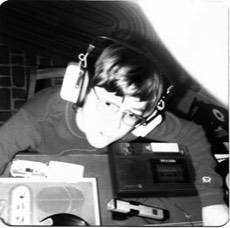
From the very beginning, Neil Kesterson has been a sound designer for film, video, television, theatre, games, web, and multimedia. His very first sound design job was to recreate the Bell X-1 breaking the sound barrier, of which pilot and aviation legend Chuck Yeager said was the most realistic he had ever heard.
Neil Kesterson's work has been heard on most major television and radio networks, in theaters, on video, and in arenas. Some projects of note include:
- Documentaries "A&E Biography: The Monkees"; "Nick Nolte: No Exit"; "Henry Clay and the Struggle for the Union"; "The Johnny Cash Anthology"
- Television shows "Treme" (HBO); “Phineas & Ferb” (Disney); "Rescue 911" (CBS); "Law & Order SVU" (NBC)
- Motion pictures “Diary of a Wimpy Kid: Dog Days”; "Felon"; "Strange Wilder- ness"; "Hide and Seek"
- Commercials for Toyota Motor Manufacturing; Applebee's; Keeneland Race Track; University of Kentucky
- Audio books "Bounce Back by John Calipari with David Scott" and “The Emperor of Time” by Gregory King
- Novelty item "The Dick Vitale Alarm Clock"
- Comedy CDs for Mike Macrae, Jesse Joyce, and Greg Warren
- Awards include those from the International Broadcasting Awards, Silver Microphone Awards, and the American Advertising Federation.
FILM CREDITS
A Production of
Dynamix Productions, Inc.
In Association with
Post Time Productions
Written and Produced by
Neil Kesterson
Narration
Margo Buchanan
Edited by
Neil Kesterson
Darren Platt
Cinematography
David Cottingham
James Oschenbein
Kody Kiser
Neil Kesterson
Video Recording
Post Time Productions
Video Recording Assistance
Armed Forces Network
Audio Recording
Neil Kesterson
Dane Dickmann
Art Direction
Mara Kesterson
QUOTES
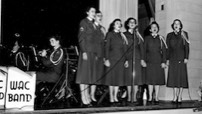
Judith (Tothe) Bigham
"I was going for the Air Force, and I passed all the qualifications to get in the Air Force. And he said, ‘now what would you like to do, young lady?' And I said I wanted to play in the band. He said ‘Oh, no, no, no. Women can’t play in the band.' I said 'Why not?' ‘For the obvious reasons, you’re a woman.’ I said ‘Oh. Well how about the Navy?’ He said ‘Oh, no, no, no. You don’t understand. You can’t play in any band, unless it’s the WAC Band. All other bands are closed to females.’ And back in the 70’s you pretty much accepted that answer.
Starrann Wise
"My fifteen minutes of fame was seconds at a time. ‘Oh God, I played that one note right. That’s cool, I can do this.’"
Christine Schafrik
"I didn’t realize at the time that the Women’s Army Corps Band was a group of handpicked musicians. It wasn’t just another post band that you got assigned to. It was a very select, elite group of musicians. And, I’ve played all my life, and that still stands as one of the truly great wind ensembles I’ve played with. Just a spectacular group of musicians."
Robert Delano
"I felt like I was special, because I was doing something that not many people did. And I was doing it as a woman – a kid, but I was a woman at that time."
Janice (Richards) Larson
"But because we’re in the public eye, we’re the only thing the public sees of the Army. And, if we’re not the recruiting poster-picture of what the military should be all about, then we’re not telling the right story."
Jeanne Pace
"It was more difficult than you think. A lot of people think we just play our instrument and that’s it, we don’t do anything else. But we really worked hard. And a lot of times we had to give up our meals sometimes because we had to be at a certain place at a certain time."
Bernice Goldstein
"Probably the hardest adjustment we had to make, was the difference in the performance standards. Because when they integrated the men into our band, we lost the status of being the band that had marched three presidential inaugural parades. And had played the White House, played at the Pentagon, and we lost that special status.
The men did not have the same performance standards that we did. For the male musicians, the premiere Army bands were considered a goal, and a step up. But we were already considered on a par with those premiere bands."
Karen Syverson
"First military assignment, first duty assignment, so you’ve got all the apprehension, all the excitement, al the nervousness, all the unknown things that are going on. And I knew nothing of the heritage of the Women’s Army Corps Band. And didn’t understand what little piece of history I was joining by becoming a member of that band."
Robert Delano
"It’s a shame that this band no longer exists and goes out and kind of spreads the message of what where all the women in the service came from was the Women’s Army Corps, and all these musicians have an opportunity to go into these other bands and better themselves because of this organization right here."
Starrann Wise
"One girl played the saw,. It sounded so strange echoing through these barracks. 'Wooooo.' We didn't know what it was."
Marylin (Harris) Ferraris
"Well I was on a tour one time and I went into a restaurant. There was a fellow playing a saw, and it intrigued me. So I went out and bought one, and I started learning how to play it."
Bernice Goldstein
PRODUCTION STILLS

